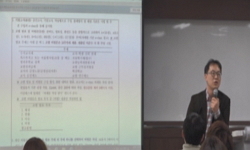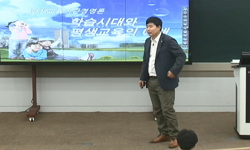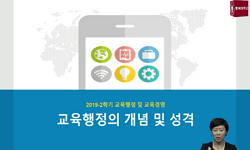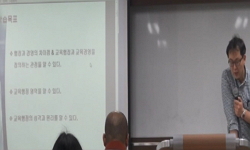본 연구의 목적은 경영 시뮬레이션 게임을 활용한 경영 교육방법을 개발하는 것이다. 경영 시뮬레이션 게임은 교육생이 가상 기업을 경영하면서 자연스럽게 기업 경영을 이해하고, 경영 의...
http://chineseinput.net/에서 pinyin(병음)방식으로 중국어를 변환할 수 있습니다.
변환된 중국어를 복사하여 사용하시면 됩니다.
- 中文 을 입력하시려면 zhongwen을 입력하시고 space를누르시면됩니다.
- 北京 을 입력하시려면 beijing을 입력하시고 space를 누르시면 됩니다.

경영 시뮬레이션 게임을 활용한 경영교육 방법에 관한 사례 연구 = A Case Study on the Business Education Method using Business Simulation Game
한글로보기https://www.riss.kr/link?id=A104960727
- 저자
- 발행기관
- 학술지명
- 권호사항
-
발행연도
2010
-
작성언어
Korean
- 주제어
-
등재정보
KCI등재
-
자료형태
학술저널
- 발행기관 URL
-
수록면
283-309(27쪽)
-
KCI 피인용횟수
10
- 제공처
-
0
상세조회 -
0
다운로드
부가정보
국문 초록 (Abstract)
본 연구에서 경영 시뮬레이션 게임에 관한 선행 연구, 경영 교육용 시뮬레이션 게임의 개발 및 교육 경험, 전문가들과의 workshop을 기반으로 경영 시뮬레이션 게임을 활용한 교육방법을 하나의 사례로서 개발하였다. 보다 구체적으로, 본 연구에서는 국내 회사에서 개발한 경영 종합 시뮬레이션 게임 소프트웨어를 기반으로 교육목표, 교육대상, 교육과정, 교육 진행방법, 경영미션, 경영 분석 도구, 피드백, 평가 방법의 측면에서 경영 교육방법을 제시하였다. 그 다음에, 본 연구에서 개발한 경영 시뮬레이션 게임 기반의 교육방법을 통해서 교육을 진행한 다음에 교육효과를 측정하였다. 그 결과, 교육생들은 경영 시뮬레이션 게임의 교육효과에 대해서 높게 평가하는 것으로 분석되었다.
본 연구는 두 가지 측면에서 경영 시뮬레이션 게임 교육에 기여한다고 볼 수 있다. 첫째, 본 연구에서 제시된 경영 교육방법은 경영 시뮬레이션 게임의 교육효과를 높이는데 기여할 것이다. 둘째, 본 연구의 결과는 경영 시뮬레이션 게임 산업의 활성화에 부분적으로 기여를 할 것이다. 이를 통해 경영 교육의 품질을 높여서 경영 교육의 경쟁력을 향상할 수 있고, 나아가서 기업들이 필요로 하는 인재를 육성할 수 있을 것으로 기대한다.
본 연구의 목적은 경영 시뮬레이션 게임을 활용한 경영 교육방법을 개발하는 것이다. 경영 시뮬레이션 게임은 교육생이 가상 기업을 경영하면서 자연스럽게 기업 경영을 이해하고, 경영 의사결정 능력을 높이고, 전략적 마인드를 향상할 수 있는 장점 때문에 대학의 경영 교육 및 기업의 인재 육성 도구로서 널리 활용되고 있다. 그러나 경영 시뮬레이션 게임을 활용한 체계적인 교육방법이 부족하다 보니 경영 시뮬레이션 게임 기반의 교육 효과가 제한적이다. 따라서 경영 시뮬레이션 게임을 활용한 체계적인 교육방법의 개발이 필요한 시점이다.
본 연구에서 경영 시뮬레이션 게임에 관한 선행 연구, 경영 교육용 시뮬레이션 게임의 개발 및 교육 경험, 전문가들과의 workshop을 기반으로 경영 시뮬레이션 게임을 활용한 교육방법을 하나의 사례로서 개발하였다. 보다 구체적으로, 본 연구에서는 국내 회사에서 개발한 경영 종합 시뮬레이션 게임 소프트웨어를 기반으로 교육목표, 교육대상, 교육과정, 교육 진행방법, 경영미션, 경영 분석 도구, 피드백, 평가 방법의 측면에서 경영 교육방법을 제시하였다. 그 다음에, 본 연구에서 개발한 경영 시뮬레이션 게임 기반의 교육방법을 통해서 교육을 진행한 다음에 교육효과를 측정하였다. 그 결과, 교육생들은 경영 시뮬레이션 게임의 교육효과에 대해서 높게 평가하는 것으로 분석되었다.
본 연구는 두 가지 측면에서 경영 시뮬레이션 게임 교육에 기여한다고 볼 수 있다. 첫째, 본 연구에서 제시된 경영 교육방법은 경영 시뮬레이션 게임의 교육효과를 높이는데 기여할 것이다. 둘째, 본 연구의 결과는 경영 시뮬레이션 게임 산업의 활성화에 부분적으로 기여를 할 것이다. 이를 통해 경영 교육의 품질을 높여서 경영 교육의 경쟁력을 향상할 수 있고, 나아가서 기업들이 필요로 하는 인재를 육성할 수 있을 것으로 기대한다.
다국어 초록 (Multilingual Abstract)
This study contributes to the education of business simulation game in two aspects. First, the business education method presented in this study would make enhance the quality of business education. And second, the business education method and empirical results of this study would make partial contribution to increase the business simulation game usage in academia and industry.
This study has developed the business education method using the business simulation game. More specifically, this study has presented the business education method in terms of teaching objectives, teaching process, supporting tools like business miss...
This study has developed the business education method using the business simulation game. More specifically, this study has presented the business education method in terms of teaching objectives, teaching process, supporting tools like business mission and decision aids, instructor feedback, and evaluation method. Next, this paper has examined the effectiveness of business simulation game as a tool for business education. It was found that students and managers who were trained under the education method suggested in this paper were very satisfied with the course of business simulation game.
This study contributes to the education of business simulation game in two aspects. First, the business education method presented in this study would make enhance the quality of business education. And second, the business education method and empirical results of this study would make partial contribution to increase the business simulation game usage in academia and industry.
참고문헌 (Reference)
1 Wolfe, J., 10 : 310-313, 1998
2 김광용, "인터넷을 이용한 효과적인 원격수업의 운영-경영 모의 게임을 중심으로" 8 : 126-144, 1998
3 위정현, "온라인 게임을 활용한 전략경영 교육방법론의 효과 분석" 111-126, 2006
4 김상수, "경영 모의 게임의 교육효과에 영향을 주는 성공요인에 관한 실증적 연구" 417-427, 2008
5 김상수, "경영 모의 게임의 교육 효과에 관한 탐색적 연구" 한국경영정보학회 8 (8): 173-188, 2006
6 김상수, "경영 교육을 위한 경영 모의 게임의 활용 방안: 개발 과정 및 교육 방법을 중심으로" 한국경영정보학회 7 (7): 41-63, 2005
7 "www.G2G3.com"
8 Doyle, D., "Using a business simulation to teach applied skills-the benefits and the challenges of using student teams from multiples countries" 24 : 330-336, 2000
9 DiBattista, R. A., "Using a business simulation in the principles of management course-Learning outcomeslid perceptions" 13 : 29-32, 1986
10 Gosen, J., "Total enterprise simulation learning compared to traditional learning in the business policy course" 29 : 281-286, 2002
1 Wolfe, J., 10 : 310-313, 1998
2 김광용, "인터넷을 이용한 효과적인 원격수업의 운영-경영 모의 게임을 중심으로" 8 : 126-144, 1998
3 위정현, "온라인 게임을 활용한 전략경영 교육방법론의 효과 분석" 111-126, 2006
4 김상수, "경영 모의 게임의 교육효과에 영향을 주는 성공요인에 관한 실증적 연구" 417-427, 2008
5 김상수, "경영 모의 게임의 교육 효과에 관한 탐색적 연구" 한국경영정보학회 8 (8): 173-188, 2006
6 김상수, "경영 교육을 위한 경영 모의 게임의 활용 방안: 개발 과정 및 교육 방법을 중심으로" 한국경영정보학회 7 (7): 41-63, 2005
7 "www.G2G3.com"
8 Doyle, D., "Using a business simulation to teach applied skills-the benefits and the challenges of using student teams from multiples countries" 24 : 330-336, 2000
9 DiBattista, R. A., "Using a business simulation in the principles of management course-Learning outcomeslid perceptions" 13 : 29-32, 1986
10 Gosen, J., "Total enterprise simulation learning compared to traditional learning in the business policy course" 29 : 281-286, 2002
11 Talyor, J. N., "The use of theory power for increased research momentum in business simulation and experimental excercises research" 10 : 144-, 1983
12 Wolfe, J., "The teaching effectiveness of games in collegiate business courses: a 1973-1983 update" 16 : 251-288, 1985
13 Greenlaw, P. S., "The teaching effectiveness of games in collegiate business course" 4 : 259-294, 1973
14 Faria, A. J., "The changing nature of simulation research : a brief ABSEL history" 27 : 84-90, 2000
15 Hackleman, E., "The business simulation- an effective learning instrument" 1 : 203-209, 1979
16 Mark T., "Tackling business problems with online games"
17 Miles, W. G., "Student perceptions of skill acquisition through cases and a general management simulation" 17 : 7-24, 1986
18 Washbush, J., "Simulation performance learning, and struggle" 22 : 1-4, 1995
19 Meier, A. C., "Simulation in business and economies" Prentice-Hall Publishing Company 1969
20 Dittrich, J. E., "Realism in business game : a three game comparison" 3 : 273-280, 1977
21 Savery, J. R., "Problem based learning : an instructional model and its constructivist framework" 35 : 31-38, 1995
22 Adobor, H., "Management simulations: determining their effectiveness" 25 (25): 151-168, 2006
23 Klibbee, J. M., "Management games" Reinhold Publishing Company 1961
24 Jackson, J. R, "Learning from experience in business decision games" 1 : 23-29, 1959
25 David, J. I., "Integrating decision support system and business games" 14 : 63-66, 1987
26 Linda K., "Experiential Learning - Business benefit or fun and games?"
27 Waggner, H. A., "Expand the role of your simulation with creative scenario" 9 : 232-, 1982
28 David Van Over, "Evaluation of a simulation game as education tool for utility professionals" 20 : 140-, 1993
29 Harris, A., "Effective teaching a review of the literature" 18 : 169-183, 1998
30 AL-JIBRI, S. H., "Design and experience with a computer game for teaching construction project planning and control" 5 : 418-427, 2001
31 R. Sharda, "Decision support system effectiveness : A review and an empirical test" 34 : 139-159, 1988
32 Andlinger, G. R., "Business games-play one!.Harvard Business Review.Vol.36:115-125" 36 : 115-125, 1958
33 Faria, A. J., "Business Simulation games : Current usage levels a ten years update" 23 : 22-28, 1996
34 Wellington, W. J., "An investigation of the relationship between simulation play, performance level and recency of play on exam scores" 18 : 111-115, 1991
35 McJenny, J. L., "An evaluation of a business game in an MBA curriculum" 35 : 278-, 1962
36 Faria, A. J., "An empirical evaluation of the pedagogical value of playing a simulation game in a principles of marketing course" 17 : 53-57, 1990
37 Kyrylov, V., "Advanced simulation gaming technology and business education" Simulation &Gaming 2004
38 Faria, A. J., "A survey of the use of business games in academy and business" 18 : 207-224, 1987
39 Anthony, P. R. A., "A study of the educational value of management games" 39 : 339-352, 1966
40 Gilgeous, V., "A study of business and management games" 9 : 32-39, 1996
41 Keys, B., "A review of learning research in business gaming" 25-32, 1976
42 Keys, J. B., "A review of business games" 48-73, 1990
43 Robinson, "A comparison of simulation, case studies and problem papers in teaching decision making" Cooperative Research Projec 1964
동일학술지(권/호) 다른 논문
-
- 한국경영교육학회
- 황현주
- 2010
- KCI등재
-
한국채택국제회계기준(K-IFRS) 조기도입 기업의 회계처리에 관한 사례연구
- 한국경영교육학회
- 이승태
- 2010
- KCI등재
-
- 한국경영교육학회
- 민종언
- 2010
- KCI등재
-
중국 승용차 시장에서 동풍열달기아(DYK)의 성공 사례연구
- 한국경영교육학회
- 손병규
- 2010
- KCI등재
분석정보
인용정보 인용지수 설명보기
학술지 이력
| 연월일 | 이력구분 | 이력상세 | 등재구분 |
|---|---|---|---|
| 2026 | 평가예정 | 재인증평가 신청대상 (재인증) | |
| 2020-01-01 | 평가 | 등재학술지 유지 (재인증) |  |
| 2017-01-01 | 평가 | 등재학술지 유지 (계속평가) |  |
| 2013-01-01 | 평가 | 등재학술지 유지 (등재유지) |  |
| 2011-01-24 | 학술지명변경 | 한글명 : 경영교육논총 -> 경영교육연구 |  |
| 2010-01-01 | 평가 | 등재학술지 유지 (등재유지) |  |
| 2007-01-01 | 평가 | 등재학술지 선정 (등재후보2차) |  |
| 2006-01-01 | 평가 | 등재후보 1차 PASS (등재후보1차) |  |
| 2005-01-01 | 평가 | 등재후보 1차 FAIL (등재후보2차) |  |
| 2004-01-01 | 평가 | 등재후보 1차 PASS (등재후보1차) |  |
| 2003-01-01 | 평가 | 등재후보학술지 선정 (신규평가) |  |
학술지 인용정보
| 기준연도 | WOS-KCI 통합IF(2년) | KCIF(2년) | KCIF(3년) |
|---|---|---|---|
| 2016 | 1.39 | 1.39 | 1.34 |
| KCIF(4년) | KCIF(5년) | 중심성지수(3년) | 즉시성지수 |
| 1.3 | 1.28 | 1.351 | 0.59 |




 DBpia
DBpia






